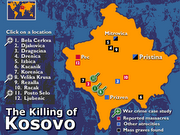Europe urged to ready "Plan B" for Kosovo
By Mark JohnMon Oct 1, 11:56 AM ET
The European Union must agree a legal basis for dealing with Kosovo, which appears headed for a de facto independence without a United Nations agreement on its future, Western experts on the Balkans said on Monday.
The EU has long sought a U.N. Security Council resolution sealing the future of the breakaway Serb province but that is seen as unlikely given Russian resistance and the deadlock between Serbs and Kosovo Albanians.
Instead, EU capitals who favor an independent Kosovo should find an alternative legal basis for an EU mission there. At the same time they have to persuade doubters in the bloc not to veto the presence of such a mission, the experts said.
A split over Kosovo would not only undermine EU plans to take over police duties in the U.N.-administered province but wreck its credibility in the very region where it was found wanting when the Balkans wars of the 1990s erupted.
"We know that the last half a dozen are not going to be persuaded," Gareth Evans, head of the International Crisis Group think-tank, said of the clutch of mostly small European states which are most reluctant to accept Kosovo's independence.
"But the others can and should be looking to be ready to take a decision early next year," he told a Brussels conference, adding that he doubted last-ditch diplomatic efforts to resolve the stand-off would produce results by a December 10 deadline.
Evans said that in the absence of a new U.N. mandate, legitimacy for the EU presence involving some 1,850 police and judicial personnel could be provided by invitations from the Kosovo leadership and U.N. Secretary-General Ban Ki-moon.
"It would be a 'double hook'," he said, noting that any effort by the West to remold the existing U.N. Security Council Resolution 1244 for a post-independence Kosovo would likely face resistance from Moscow and others.
Major powers have set a December 10 deadline for an agreement on the final status of Kosovo, which has been in legal limbo under U.N. administration since 1999, when NATO waged an air war to drive out Serbian forces and halt ethnic cleansing.
Serbia, backed by Russia with its U.N. veto power, rejects independence for Kosovo. But the territory's 2 million ethnic Albanians -- 90 percent of the population -- will settle for nothing less and have received Washington's backing.
"CONSTRUCTIVE ABSTENTIONS"
Alongside the United States, Britain and France lead a majority of EU states ready to recognize Kosovo's sovereignty. Spain, Hungary, Greece, Slovakia, Cyprus and Romania are reluctant either because of their proximity to the Balkans or fears it could encourage separatists at home.
Former European Parliament President Pat Cox urged reluctant EU countries to allow the EU mission to proceed without them.
"Doubters should be invited to engage in constructive abstentions. It is a capacity that is available when there are opinions short of consensus," he said of an arrangement under which states would not use their right to veto EU policy.
Question marks remain over the reaction of Germany to a unilateral declaration of independence by Kosovo.
Diplomats say Berlin has concerns over the legal basis of its large contingent within NATO-led 17,000-strong peace force in Kosovo and argues that a simple invitation by Pristina would not provide solid enough grounds for a long-term presence.
They say that while Chancellor Angela Merkel would rally to an independence declaration by Kosovo, her junior coalition partners the Social Democrats are less keen.
Subscribe to:
Post Comments (Atom)


No comments:
Post a Comment